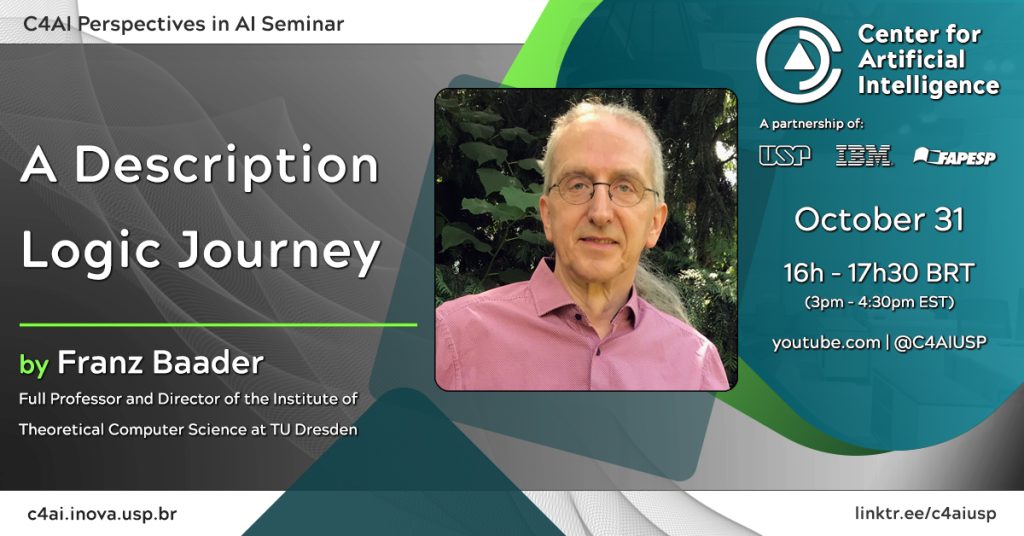
[C4AI – Perspectives in A.I. Seminar] Perspectives in AI seminar of the C4AI hosted Prof. Dr. Franz Baader (TU Dresden – Germany), on October 31th, 16h – 17h30 Brasilia time (3pm – 4:30pm EST), to talk about “A Description Logic Journey” (open/free/online event – recorded seminar on youtube @C4AIUSP).
Title: “A Description Logic Journey” (Seminar in English)
Open and Free seminar
C4AI Youtube Channel : https://www.youtube.com/c/C4AIUSP
Seminar Link: https://www.youtube.com/watch?v=3WBIQY-LBzI
Perspectives in A.I. Seminar:
Prof. Dr. Franz Baader to talk about “”A Description Logic Journey”
Abstract:
Description Logics (DLs) are a well-investigated family of logic-based knowledge representation formalisms, which are frequently used to formalize ontologies in various application areas such as the Semantic Web, biology, medicine, mechanical engineering, chemical process engineering, civil engineering, and situation recognition. An important design goal when developing a DL is to find a good compromise between the expressiveness of the representation language and the complexity of reasoning (i.e., computing implicit consequences of the formal statements in the ontology). In the first wave of DL research, the trend was to go towards more expressive DLs by adding new concept constructors, which were motivated by specific applications, but turned out to be useful also in other domains. Whereas reasoning in the obtained expressive DLs had a high worst-case complexity, highly optimized DL systems nevertheless behaved well in practice. With the adoption of the DL- based standard ontology language OWL, the number and the sizes of ontologies grew rapidly, which made efficient reasoning all the more important. This triggered a second wave of DL research, in which lightweight DLs with tractable reasoning problems (i.e., ones solvable in polynomial-time) were designed, such as the members of the EL family. Another trend was that ontology-based reasoning about data became more important, which led to the development of the DL-Lite family of DLs, which allowed reducing reasoning about data with respect to DL-Light ontologies to answering relational database queries. It then became apparent that the specialized algorithms developed for lightweight DLs, such as the consequence-based reasoning procedures for EL, could also be adapted to more expressive DLs. Although these algorithms are then no longer guaranteed to run in polynomial time, they show a “pay as you go” behavior, i.e., they can deal with the expressive language, but are the more efficient the less “costly” concept constructors are used in the ontology. Due to the research efforts of the last 30 years, the DL community can now offer a large portfolio of different representation languages and reasoning systems to ontology engineers and users of ontologies, from which they can choose the language and system that best fits the application at hand.
Brief bio:
Dr.Franz Baader is full Professor and Director of the Institute of Theoretical Computer Science at TU Dresden, Germany. He has authored influential papers in those subjects and is a co-author of the popular book The Decription Logic Handbook: Theory, Implementation and Applications, Cambridge Press, 2003. He is a Fellow of the European Coordinating Committee for Artificial Intelligence (ECCAI), and has been a member of the editorial board of several journals including the Journal of Applied Logic, the Journal on Logical Methods in Computer Science, the Journal of Automated Reasoning, the Journal of Artificial Intelligence Research, the Artificial Intelligence Journal.
#c4ai #ArtificialIntelligence #AIResearch #DescriptionLogics






Comments are closed